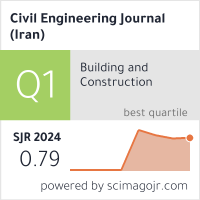Characteristics of Traffic Accidents in Baghdad
Downloads
Road traffic accidents (RTAs) are events that suddenly, inadvertently and unexpectedly occur under unforeseen circumstances that involve at least one moving vehicle and result in one or more road users being killed or injured. Unfortunately, Iraqi governorates suffer from higher rates of traffic accident casualties compared with the rates of casualties from terrorist attacks; this situation reveals a serious and growing problem. Road traffic accidents are not easy to eradicate. However, their prevalence can be reduced to the barest minimum via periodic assessments of traffic accident characteristics and the most important aspects for road authorities to consider when designing and evaluating the performance of a road to improve traffic and road users' safety.Therefore, the primary objective of this paper is to evaluate traffic accidents in Baghdad using a retrospective analysis of accidents that occurred from 2006–2016 taking into consideration the following parameters: the cause of the accident, the genders of the victims, the number and type of vehicles involved in the accident, the time of the accident, the severity of the accident, the type of accident and the age group of the driver(s). The data were been obtained from the Central Statistical Organization in the Ministry of Planning. The results reveal that 12,019 RTAs occurred in the city of Baghdad; on average, 1,092 RTAs occurred each year. Twenty-two percent of the RTAs resulted in death, 67% resulted in injury and 6% resulted in both deaths and injuries. Only 4% of the RTAs resulted in property damage without victims. To this end, Baghdad has the highest prevalence of RTAs of all Iraqi governorates. These results provide scientific evidence to mobilize road authorities to effectively and urgently develop adequate traffic strategies and policies to reduce the epidemic of RTAs in Baghdad as well as other Iraqi governorates.
Downloads
[2] Albayati, Amjad Hamad, and Roaa Hamed Lateif. "Statistical Analysis of Mortality and Morbidity Due to Traffic Accidents in Iraq." Journal of Engineering 24, no. 1 (2018): 20-40.
[3] Al-Khateeb, G. G. (2010). Analysis of accident data and evaluation of leading causes for traffic accidents in Jordan. Jordan J Civ Eng, 4(2), 76-94.
[4] Choueiri, Elias M., Georges M. Choueiri, and Bernard M. Choueiri. "Analysis of accident patterns in Lebanon." In 4th International Symposium on Highway geometric Design, Valencia, Spain, 2010.
[5] Farag, Siham Gaber, Ibrahim H. Hashim, and Saad A. El-Hamrawy. "Analysis and assessment of accident characteristics: Case study of Dhofar governorate, Sultanate of Oman." Int J Traffic Trans Eng 3 (2014): 189-98. doi:10.5923/j.ijtte.20140304.03.
[6] Touahmia, Mabrouk. "Identification of risk factors influencing road traffic accidents." Engineering, Technology & Applied Science Research 8, no. 1 (2018): 2417-2421.
[7] Cioca, Lucian-Ionel, and Larisa Ivascu. "Risk Indicators and Road Accident Analysis for the Period 2012–2016.” Sustainability 9, no. 9 (August 28, 2017): 1530. doi:10.3390/su9091530.
[8] Al-Jameel, Hamid Athab. "Reducing the Number of Accidents in Iraq by Using Expert System." Journal of University of Babylon 24, no. 4 (2016): 1099-1112.
[9] Leidman, Eva, Maret Maliniak, Abdul-Salam Saleh Sultan, Ahmed Hassan, Syed Jaffar Hussain, and Oleg O. Bilukha. "Road Traffic Fatalities in Selected Governorates of Iraq from 2010 to 2013: Prospective Surveillance.” Conflict and Health 10, no. 1 (February 24, 2016). doi:10.1186/s13031-016-0070-0.
[10] American Association of State Highway and Transportation Officials. A Policy on Geometric Design of Highways and Streets, American Association of State Highway and Transportation Officials, 2001.
- Authors retain all copyrights. It is noticeable that authors will not be forced to sign any copyright transfer agreements.
- This work (including HTML and PDF Files) is licensed under a Creative Commons Attribution 4.0 International License.![]()















